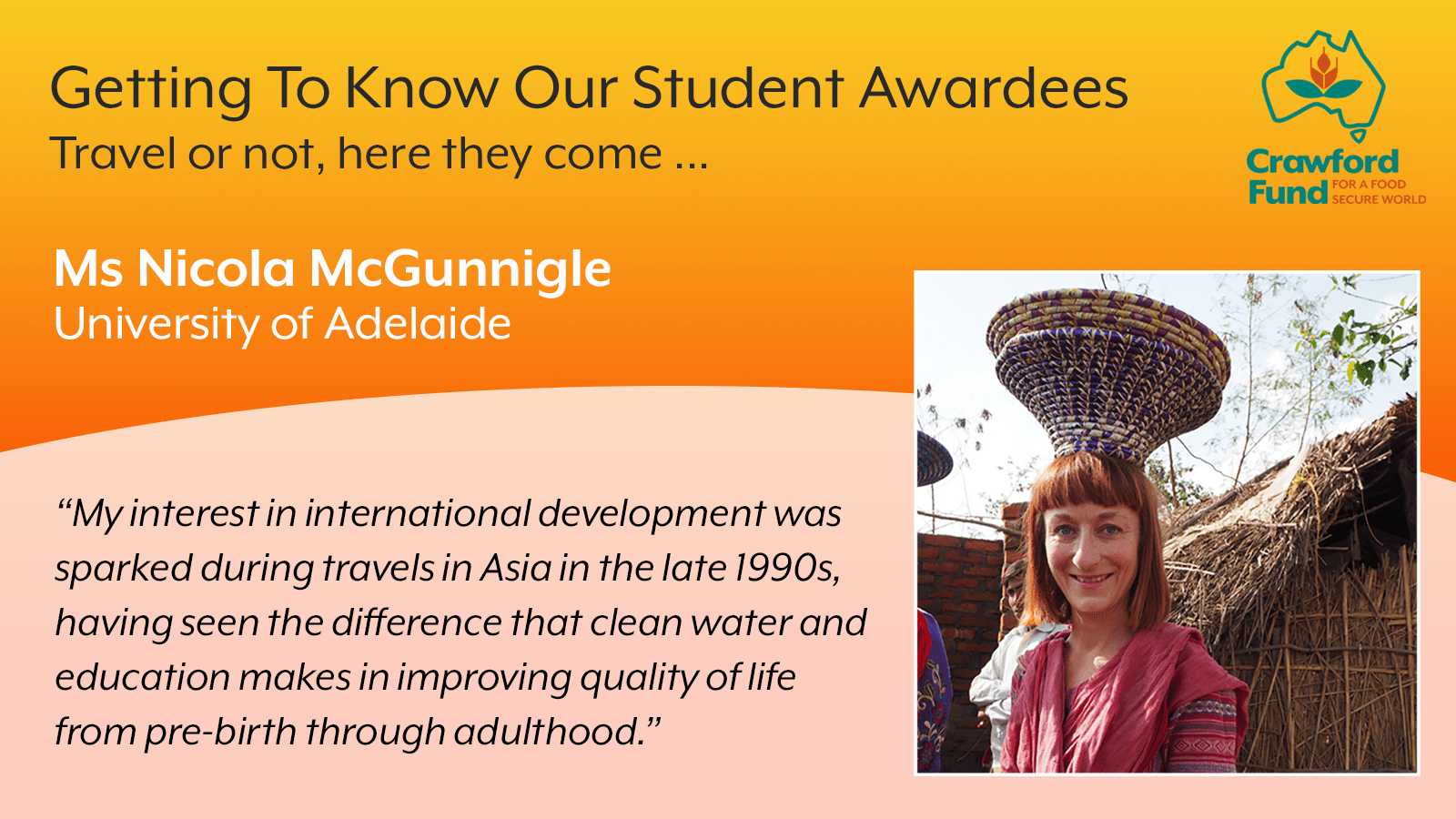

Getting to know our Student Awardees – Nicola McGunnigle, University of Adelaide
February 24, 2022

Last year we announced our 2021 Student Awardees – those talented students from around Australia selected by our State and Territory Committees to experience international agricultural research and development firsthand, in a COVID safe manner of course!
The 2021 recipients will carry out research across a diverse range of topics, focused in Australia, Laos, Uruguay, Vietnam, Fiji, Mexico, Samoa, Uruguay, Malaysia, Brazil, Nepal and Myanmar. We would like to thank our partner organisations for making these opportunities available, including the Australian Centre for International Agricultural Research, Grains Research and Development Corporation, International Maize and Wheat Improvement Center (CIMMYT), and the Sunrice Rice Research Facility.
We are excited to now bring you more details of each of our Awardees, their projects, and what they hope to achieve with the opportunity provided by our support. We are pleased to also provide input from our awardees’ supervisors on what they see as the benefit of the opportunity to add an international component to their student’s studies and research.
Presenting:
Nicola McGunnigle
PhD Student
University of Adelaide
Research: Enhancing Livelihoods from Improved Forest Management in Nepal
Supervisor
“Nicola is working with the partners in our ACIAR project from ForestAction Nepal and Nepal Agroforestry Foundation. The ACIAR project is concerned with improving silviculture, institutional and policy arrangements and markets for community forests. Nicola’s study complements this by focusing on the radical alternative of rewilding, asking questions about alternative land use. Whatever the answers are, we expect a more comprehensive view of alternative futures.”
Dr Ian Nuberg, Senior Lecturer, School of Agriculture, Food & Wine, Waite Campus, University of Adelaide
How did you become interested in international ag for development and focusing your research in developing countries?
My interest in international development was sparked during travels in Asia in the late 1990s. Having seen the difference that clean water and education makes in improving quality of life from pre-birth through adulthood. I have since clocked up numerous hours volunteering with NGOs supporting partner organisations across the developing world. Food security and nutrition are fundamental actors, and so my horizon grew. My research now brings together over 20 years of professional environmental science experience and over a decade of international community development volunteering, with a special interest in Nepal. Having seen how communities can gain from self-identifying their needs in development, and the difference minor intervention can make to uplift the poorest and most marginalised communities, I was motivated to put these skills into a research area that might deliver benefits to marginal land holders. Growing rates of abandoned and underutilised agricultural land in Nepal’s middle hills is a complex socioecological phenomenon that requires understanding the farmer’s motives to address for sustainable outcomes.
Have you had any former experience in ag for development?
My most recent work experience in Nepal was with a local NGO, liaising with international partner organisations. Reporting outcomes and impact stories demonstrated how communities can become empowered with recognition and support. I particularly loved hearing stories from participants of how lives were uplifted through the development programs and sharing these stories with financial donors.
Are there benefits to Australia from the proposed award work?
Maintaining relationships with partner organisations in receipt of government funding provides respect for Nepalese research partners and cultural systems. The research ideas and methodologies, in terms of exploring attitudes to and value of marginal land and self-restored forest, can potentially be applied to marginal agricultural land in Australia.
Please tell us about what you hope to do as part of your award and the impact it may achieve.
As a follow up to household surveys across three districts in Nepal in 2021, which have been facilitated by Nepali researchers, I am looking forward to following up respondents and key stakeholders with themes that emerge from the findings. This will entail travel to Nepal and visiting rural communities to talk with groups and individuals about barriers to utilising their agricultural land, and potential benefits from diversified land uses (such as agroforestry and self-restored forest). Assessing farmer’s attitudes will assist with understanding what livelihoods are most sustainable for future benefits, including environmental.
Do you have a strategy to carry out the award research, even if travel is not possible, that you’d like to share with other awardees?
Phase 1 field research has been enabled through collaboration with an in-country researcher. If travel is not possible in 2021, I shall pursue networking opportunities with in-country experts to enable interviews on -line and through on-the-ground interpreters.
What do you want to be working on in the future?
I would love to be working with, or consulting to, organisations that partner with international development projects that empower local farmers to better their livelihoods.
Do you have advice for others interested in getting involved in international ag development?
Follow your interests and passions, take opportunities when they arise, and always stop to hear others’ voices and see the world from their view.
Any other comments?
I am loving every day in research and knowing that the findings will one day help someone, somewhere.




